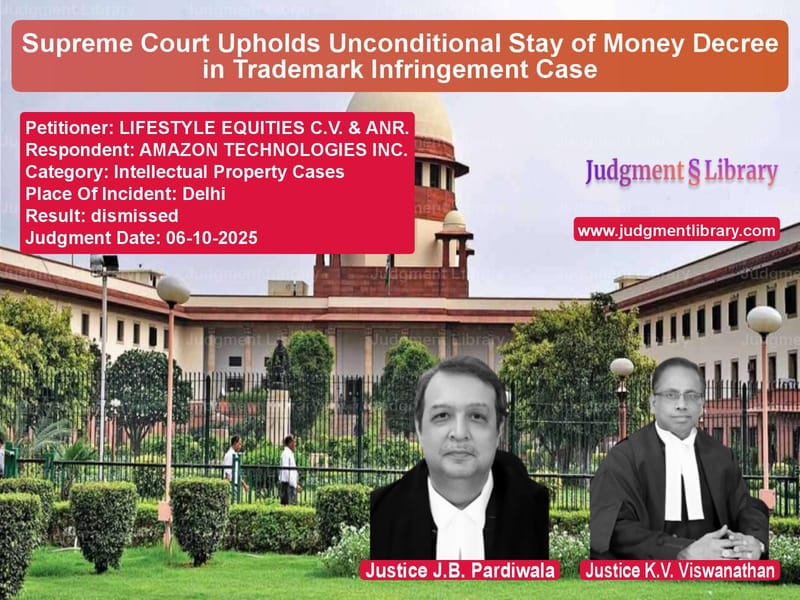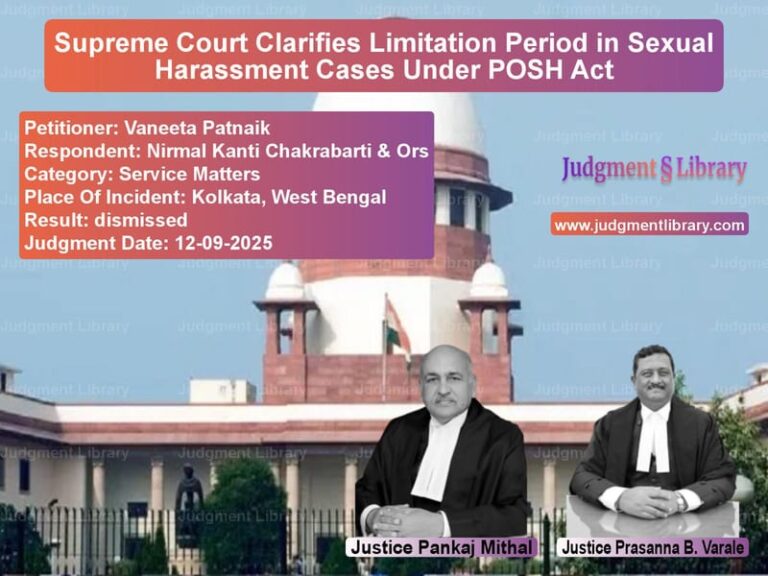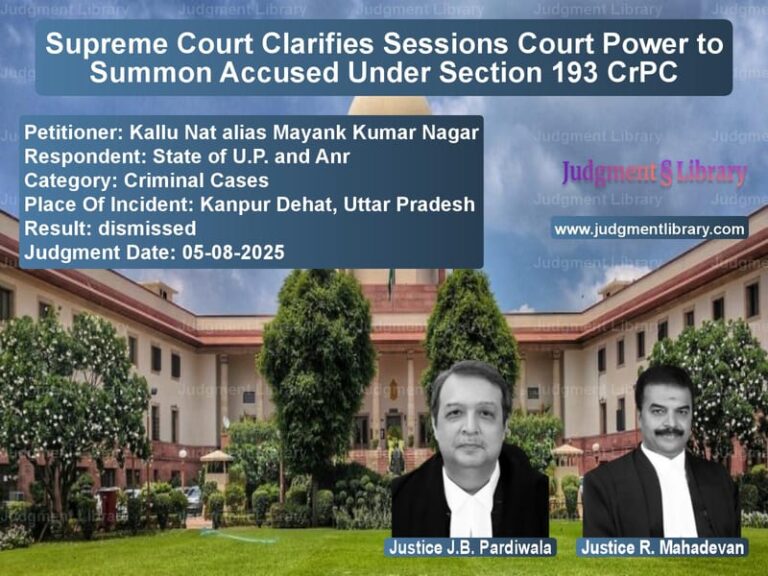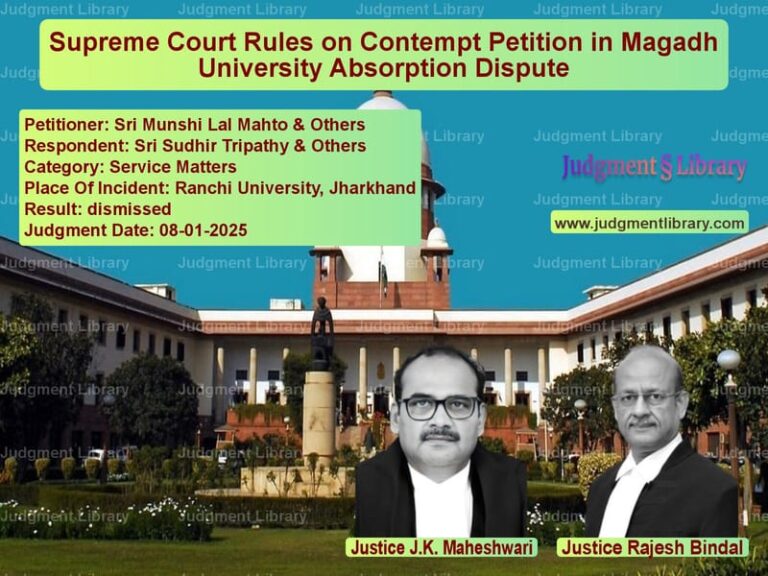Supreme Court Upholds Unconditional Stay of Money Decree in Trademark Infringement Case
In a landmark judgment that clarifies the legal principles governing stay of money decrees, the Supreme Court of India has upheld the Delhi High Court’s decision to grant unconditional stay of execution of a massive ₹336 crore decree in a trademark infringement case. The case pitted Lifestyle Equities CV, owner of the Beverly Hills Polo Club trademark, against Amazon Technologies Inc., in a dispute that raised fundamental questions about procedural justice and the circumstances under which courts can stay money decrees without requiring deposit of the disputed amount.
The Background of the Trademark Dispute
The legal battle began when Lifestyle Equities filed a suit in the Delhi High Court alleging that Amazon Technologies had been unlawfully using a mark identically or deceptively similar to their registered Beverly Hills Polo Club trademark. The plaintiffs claimed extensive goodwill and recognition for their distinctive logo featuring a charging Polo pony with a mounted rider wielding a raised polo stick. What started as a claim for ₹2 crore in damages eventually ballooned to a staggering ₹336 crore decree passed by the Single Judge of the Delhi High Court.
The Procedural Irregularities
The case took a dramatic turn when it was revealed that Amazon Technologies had been proceeded against ex-parte, meaning the case was heard without their participation. The Division Bench of the High Court, while hearing Amazon’s appeal, discovered serious procedural irregularities. Most notably, the court found that formal summons had never been served on Amazon Technologies as required by law, yet the company had been proceeded against ex-parte and subjected to a massive money decree.
Arguments Before the Supreme Court
The petitioners, Lifestyle Equities, represented by Mr. Mukul Rohatgi and Mr. Gaurav Pachnanda, vehemently argued that the High Court committed an egregious error in granting unconditional stay of the money decree. They contended that Order XLI Rule 5 of the Civil Procedure Code makes deposit of the decretal amount mandatory for staying execution of money decrees.
Mr. Rohatgi submitted that “the Division Bench of the High Court committed an egregious error in granting the benefit of unconditional stay of the execution of money decree” and that “the impugned judgment and order passed by the Division Bench of the High Court is in gross violation and flagrant disregard of the mandatory provisions of Order XLI Rule 5(1) and Rule 5(3) of the CPC respectively.”
On the other side, Dr. Abhishek Manu Singhvi, Mr. Neeraj Kishan Kaul and Mr. Arvind Nigam, representing Amazon Technologies, argued that the High Court had correctly exercised its discretion given the exceptional circumstances of the case. They pointed to multiple legal infirmities in the original decree, including the absence of valid service of summons and the dramatic enhancement of the claim from ₹2 crore to ₹336 crore without proper amendment of pleadings.
The Supreme Court’s Legal Analysis
The Supreme Court, in its comprehensive judgment, delved deep into the legal principles governing stay of money decrees. The Court emphasized that while deposit of the decretal amount is the general rule, exceptional circumstances may warrant unconditional stay.
The Court observed that “the power of the Appellate Court to order stay of execution of the decree are not fettered in any way if there is ‘sufficient cause’ for passing such an order.” The Bench further clarified that “although the word ‘shall’ has been used in Order XLI Rule 5 CPC, yet the same is not mandatory in character.”
The judgment established clear parameters for when unconditional stay of money decrees may be granted: “the benefit of stay of execution of a money decree may be granted by the Appellate Court unconditionally, if it: (i) is egregiously perverse; (ii) is riddled with patent illegalities; (iii) is facially untenable; and/or (iv) such other exceptional causes similar in nature.”
Service of Summons: A Fundamental Right
The Court placed significant emphasis on the importance of proper service of summons, noting that “the Court’s jurisdiction over a respondent is founded on a valid service of summons. Without a valid service, the Court cannot acquire jurisdiction over the respondent, unless the defendant voluntarily submits to it.”
This aspect proved crucial in the present case, as the High Court had found that formal summons were never served on Amazon Technologies, yet the company was proceeded against ex-parte and subjected to a massive money decree.
The Dramatic Enhancement of Claims
Another critical factor that weighed with the courts was the extraordinary enhancement of the damage claim from ₹2 crore in the plaint to approximately ₹3780 crore in written submissions, ultimately resulting in a decree of ₹336 crore. The Supreme Court noted that this enhancement occurred without any amendment to the plaint and without serving the enhanced claim on Amazon Technologies.
The Court observed that “the basis for the claim for damages are, at all costs, to be contained in the pleadings of the Plaintiff. It cannot be reserved for evidence. It is a legal truism that evidence cannot traverse the pleadings.”
Legal Principles Summarized
The Supreme Court summarized its conclusions in eleven key principles, emphasizing that while deposit of decretal amount is the general practice for staying money decrees, it is not an absolute mandate. The Court held that “for the grant of benefit of an unconditional stay of execution of a decree, an exceptional case has to be made out before the appellate court. This discretion of the appellate court to grant an unconditional stay of execution of decree must not be exercised arbitrarily. It must be exercised sparingly and only if an exceptional case is made out.”
The Court also clarified that “there is no provision under Order XLI Rule 5 of the CPC imposing a mandate to deposit cash security as the only mode of security for execution of the decree. Security, for the purpose of the said provision, can be in the shape of property, bond and or in the form of an appropriate undertaking from the appellant to abide by the decree.”
Conclusion and Impact
The Supreme Court’s judgment represents a significant development in civil procedure law, particularly concerning the stay of money decrees. While reaffirming that deposit of decretal amount remains the general rule, the Court has created necessary flexibility for exceptional cases where procedural irregularities or legal infirmities in the original decree are so grave that requiring deposit would cause manifest injustice.
The Court ultimately dismissed the special leave petition, allowing the unconditional stay to continue pending disposal of the main appeal. However, the Court clarified that its observations were prima facie in nature and should not influence the final outcome of the appeal, which must be decided on its own merits.
This judgment serves as an important reminder that procedural laws are, in the words of Justice Krishna Iyer quoted by the Court, “not to be a tyrant but a servant, not an obstruction but an aid to justice. It is the handmaid of justice and not its mistress.” The ruling balances the rights of decree-holders to enjoy the fruits of their decree with the fundamental right of appellants to a fair hearing, particularly in cases involving serious procedural irregularities.
Petitioner Name: LIFESTYLE EQUITIES C.V. & ANR..Respondent Name: AMAZON TECHNOLOGIES INC..Judgment By: Justice J.B. Pardiwala, Justice K.V. Viswanathan.Place Of Incident: Delhi.Judgment Date: 06-10-2025.Result: dismissed.
Don’t miss out on the full details! Download the complete judgment in PDF format below and gain valuable insights instantly!
Download Judgment: lifestyle-equities-c-vs-amazon-technologies-supreme-court-of-india-judgment-dated-06-10-2025.pdf
Directly Download Judgment: Directly download this Judgment
See all petitions in Civil Defamation
See all petitions in Contract Disputes
See all petitions in Damages and Compensation
See all petitions in Commercial Arbitration
See all petitions in Corporate Compliance
See all petitions in Judgment by J.B. Pardiwala
See all petitions in Judgment by K.V. Viswanathan
See all petitions in dismissed
See all petitions in supreme court of India judgments October 2025
See all petitions in 2025 judgments
See all posts in Intellectual Property Cases Category
See all allowed petitions in Intellectual Property Cases Category
See all Dismissed petitions in Intellectual Property Cases Category
See all partially allowed petitions in Intellectual Property Cases Category







